
January 23, 2025 | Articles
Plotting a Roadmap to Success on the Torres de Colón Renovation
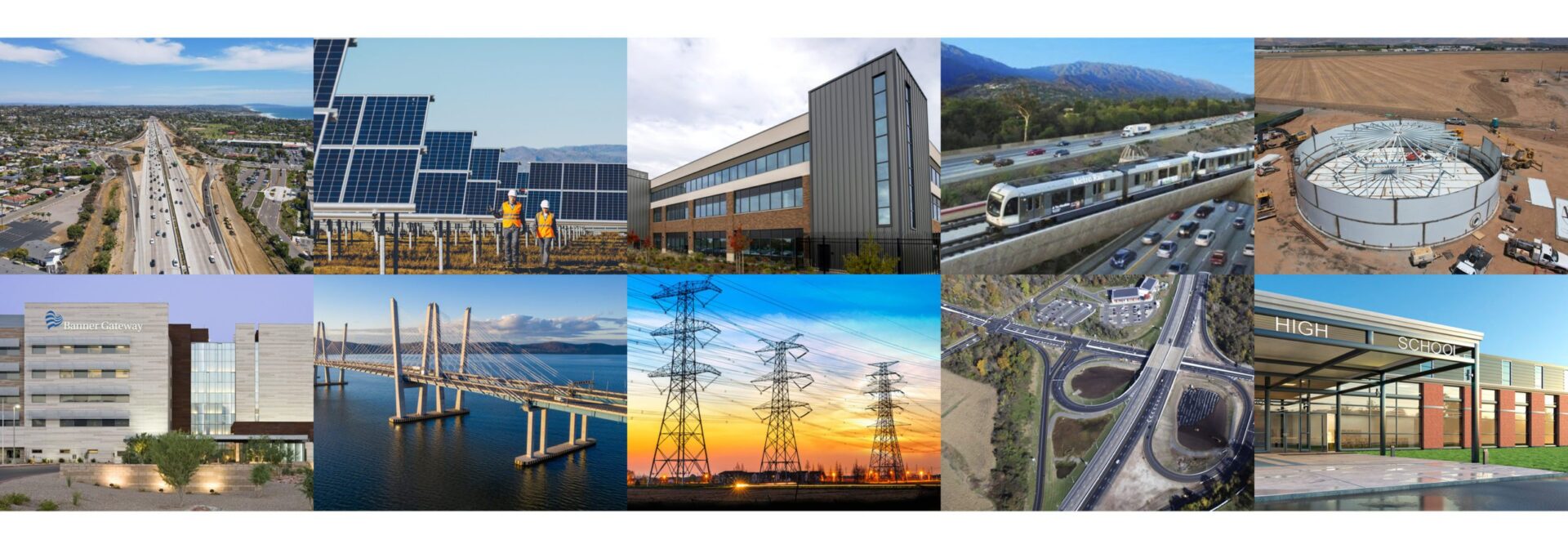
The Infrastructure Investment and Jobs Act (IIJA) has dedicated more than $1 trillion for building and improving infrastructure throughout the country. Through the IIJA’s competitive grant programs, including many specifically set aside for Tribal Nations, Native American communities have the ability to acquire funding for multiple and diverse new-construction projects that include housing, waste-water treatment, water treatment, dams, hospitals, clinics, health centers, roads, bridges, rail, public transit, ports and waterways, airports, water infrastructure, power and grid reliability and resiliency, internet access, broadband, coastal resiliency, ecosystem restoration, clean school buses, renewable energy (solar, hydro, wind), justice departments, and fire station and emergency services.
Other opportunities include the Federal Emergency Management Agency’s (FEMA) Building Resilient Infrastructure and Communities (BRIC) program. This program funds mitigation and resiliency projects, focusing on infrastructure (roads, utility systems, critical facilities, etc.). In August, FEMA released its first ever National Tribal Strategy to better address its responsibilities to Native American communities responding to and preparing for disasters. This strategy will make it easier than ever for Native American communities to access FEMA funds, such as those provided through BRIC.
Did you know? FEMA’s BRIC program has a specific amount set aside exclusively for Tribal Nations, and this amount is rarely used to its fullest extent.
To capitalize on the available funding and advance planned projects effectively, Tribal Entities can leverage Hill International’s grant application management consultancy services. Hill’s professionals have more than 20 years of experience supporting Tribes undertaking large construction endeavors throughout the U.S. and can provide full life-cycle support, including reconnaissance into available funding opportunities, pre-project planning, shepherding and auditing the grant process, owners’ representation, and project and construction management. The results are fully funded projects delivered as owners envision.

Approaching the Grant
Hill, in conjunction with renowned partner KB Advising (KBA), utilizes our vast experience accessing and implementing funds from many Federal agencies to drive our proven grant approach. “We begin with a full investigation into our clients’ strategies and ambitions,” explains Hill Vice President, Resiliency and Disaster Recovery Andy Robinson. “We sit down with leaders and stakeholders and get a sense of what their short- and long-term goals are. Then we prioritize and identify the most immediate needs. We use these conversations to identify the right grants to pursue.”
Once the team identifies multiple grants that match our clients’ goals, Hill provides comprehensive pre-project planning and advisory services to help refine project plans. This allows Hill’s grant application writers to begin preparing grant applications. In this process, our professionals use experience applying for grants and working on projects with many of the granting agencies, such as the U.S. Department of Energy, the Federal Highway Administration, and FEMA. This helps refine our clients’ grant applications and makes certain they adhere to all necessary policies, procedures, and requirements.
Did you know? Most (if not all) Federal grants cover management costs for your staff, allowing you to hire our team without any risk to your project’s budget.
Our professionals create a pool of target grant application opportunities. If not selected for the “best match” grant, the team reevaluates the submission and tailors it for the next-best grant. Hill can help clients pursue alternative funding mechanisms to increase the likelihood of fully funding our clients’ projects. Throughout the remainder of the project, Hill and KBA manage all of the grant compliance and reporting to help ensure the project adheres to all requirements of the funding departments or agencies. This gives our clients confidence and allows them to focus on what’s important: delivering their projects. With this approach, Hill and KBA have been instrumental in assisting our clients in acquiring more than $8 billion in various types of grant funding.
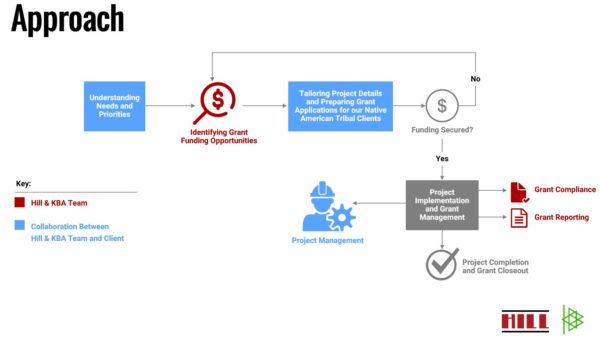
Executing Construction
In addition to managing compliance with all grant requirements, Hill can provide comprehensive program, project, and construction management for funded projects. Hill has delivered a customized suite of such services to Native American Tribes developing casinos, resorts, hotels, schools, research facilities, healthcare facilities, ballparks, and a variety of other facilities. Additionally, Hill has 46 years of experience delivering complex infrastructure work with State and Federal agencies throughout the U.S. No matter what a project involves, Hill can assemble a team with the right experience and expertise for the job.
“As an added benefit, Hill provides our Native American clients with construction professionals who understand the unique needs associated with Tribal projects and who have direct experience managing similar projects within Tribal communities,” Robinson says. “And all of our teams have experience managing the unique components these projects entail, like utility coordination, right-of-way access, jurisdiction policies, environmental requirements, historical preservation, traffic control, construction site safety and materials, and supply delivery to remote construction locations within budget and with a seamless schedule approach.”
Robinson emphasizes that while Hill offers experience, strategies, and technologies for the successful management of Native American projects, our professionals always consider themselves guests in Tribal communities’ environments. “As an international company, Hill strives to work within our clients’ unique cultural context and respect their processes,” he explains. “First and foremost, we attempt to form a cohesive unit based on trust with the owner, stakeholders, and the rest of the project team. This provides a sound basis for any construction endeavor and ensures a Tribe’s history and culture is instilled on each Tribal project we undertake.”
Final Thoughts
Tribal Nations have a unique opportunity this year, due to the incredible amount of funding available exclusively to them. By using Federal funds dedicated to Tribal communities, Native American Tribal Entities will benefit for generations to come from more resilient infrastructure, better broadband connectivity, and reliable energy sources. Hill is proud to support our Native American clients as they pursue and implement Federal funds for their transformative projects.
For more information on how Hill can help your Tribe fund its next project, reach out to Andy Robinson at [email protected]. Robinson and his team will meet with your community leaders to discuss your needs, prioritize your projects and goals, provide suggestions and options tailored to your strategy and culture, identify the grants most likely to achieve your goals, and help drive your project to completion.
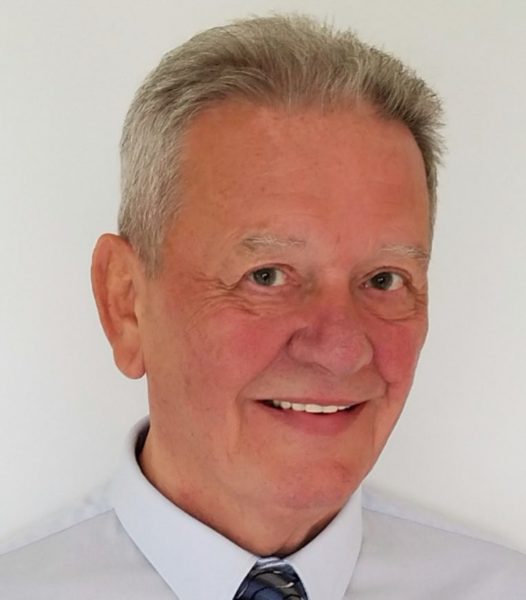
Vice President of Native American & Indigenous Program Services Harry Corken is an experienced Project Manager who specializes in Native American projects. He has worked with Tribal clients across the U.S. on numerous gaming, resort, and other facility projects. Corken is especially adept at resolving project-related problems, coordinating with stakeholders, and verifying compliance with all applicable funding sources. Harry can be reached via email at [email protected] or by phone at 715-896-6324.

Vice President, Resiliency and Disaster Recovery Andy Robinson, PMP, specializes in leading resiliency and disaster recovery assignments and served in leadership roles for the Road Home Program following Hurricane Katrina, the New Jersey Housing Program following Superstorm Sandy, and the U.S. Virgin Islands STEP program following Hurricanes Irma and Maria. Andy can be reached via email at [email protected] or by phone at 703-967-7613.
Share

January 23, 2025 | Articles
Plotting a Roadmap to Success on the Torres de Colón Renovation
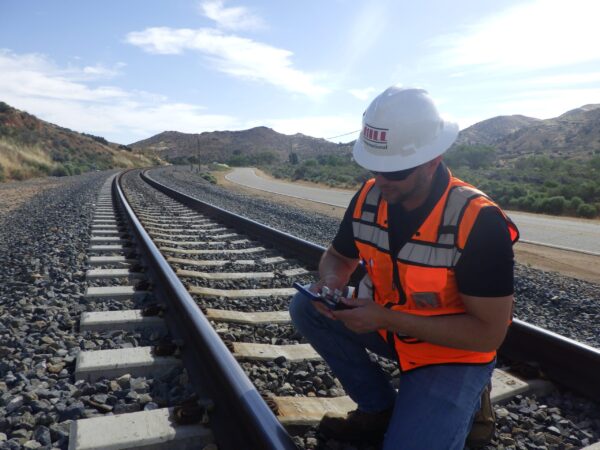
December 12, 2024 | Articles
Progressive Design-Build for Rail and Transit Projects: Room to Run

December 9, 2024 | Articles
Unlocking Growth: Maximizing the Benefits of the SBA’s Mentor-Protégé Program

December 8, 2024 | Articles
Mediterranean Luxury a Century in the Making: Four Seasons Resort Mallorca at Formentor
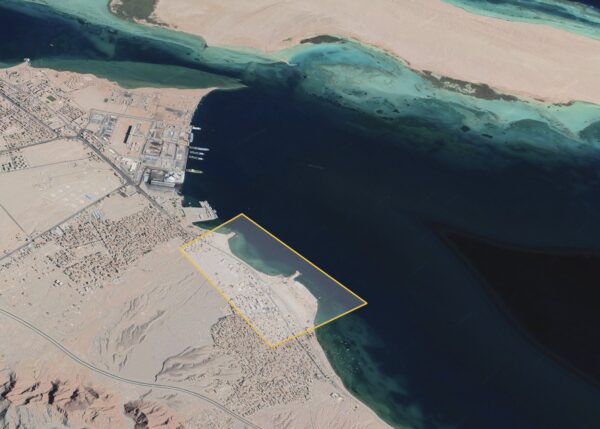
November 23, 2024 | Articles

November 15, 2024 | Articles
The Ruiz Picasso 11: Delivering Sustainability in the Heart of Madrid

November 13, 2024 | Articles
Hill International Takes Riyadh Metro Project to Finish Line

November 11, 2024 | Articles

November 3, 2024 | Articles
Negotiating Success: Hill Contract Administrator Christine Prettyman